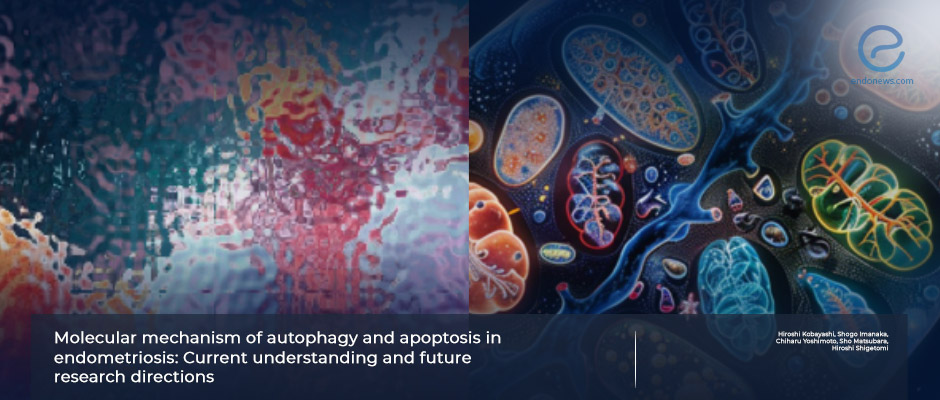Cellular mechanisms in endometriosis revisited
Sep 18, 2024
Autophagy and apoptosis have critical roles in endometriosis
Key Points
Highlights :
- Autophagy and apoptosis are important mechanisms in disease processes which could be simplified into two words consecutively: “self- eating” and “self- killing,”.
- Autophagy is an efficient regulator of apoptosis, and endometriotic tissues have high proliferative index but decreased apoptosis.
Importance:
- There is also a subset of autophagy called as “selective” that eliminates cellular components such as mitochondria (i.e., mitophagy).
- Contemporary research suggest that cells composing endometriosis are able to control apoptosis by activating or suppressing autophagy/mitophagy.
What's done here :
- This is a comprehensive narrative review of current knowledge on how autophagy/mitophagy and apoptosis alter endometriotic tissues and their progression aiming to open future research directions.
Main key feature :
- Autophagy promoting drugs may be helpful in the management of endometriosis in some lesions whereas antiautophagic drugs may be therapeutical in some via inhibiting the autophagy mediated cellular control and restoring apoptosis.
Lay Summary
Academicians from Kashihara and Nara, Japan led by Dr. Kobayashi have published their review on the cellular mechanisms of endometriotic tissues in a recent issue of Reproductive Medicine and Biology.
Endometriosis is a common global gynecologic ailment affecting millions of women. Endometrial cells that regurgitate into the peritoneal cavity face low oxygen levels and lack of nutrients. To survive these harsh conditions, endometriotic cells have developed several adaptive homeostatic strategies in their microenvironments, including evading programmed cell death (apoptosis). Autophagy, a process of self-degradation, plays a role in regulating apoptosis under stress. The pathways regulating the interactions between autophagy and apoptosis are still not well delineated.
The authors by making a comprehensive review searching PubMed and Google Scholar databases have revealed related scientific papers in this regard. Different intracellular (e.g., PI3K/AKT/mTOR signal transduction network) and extracellular (e.g., hypoxia and iron-mediated divergent reactions) factors seem to operate in progression of endometriotic foci. Finally, upregulation of mTOR expression negatively affects apoptotic pathways through inhibitions on autophagic processes. On the other hand, decrease in environmental oxygen or excess iron seem to inhibit apoptotic mechanisms.
This review highlights the current insights into autophagy's molecular features in endometriosis and explores future therapeutic challenges. Scientific research on the regulation of autophagy could well open therapeutic window for endometriosis.
Research Source: https://pubmed.ncbi.nlm.nih.gov/38645639/
endometriosis autophagy apoptosis hypoxia

